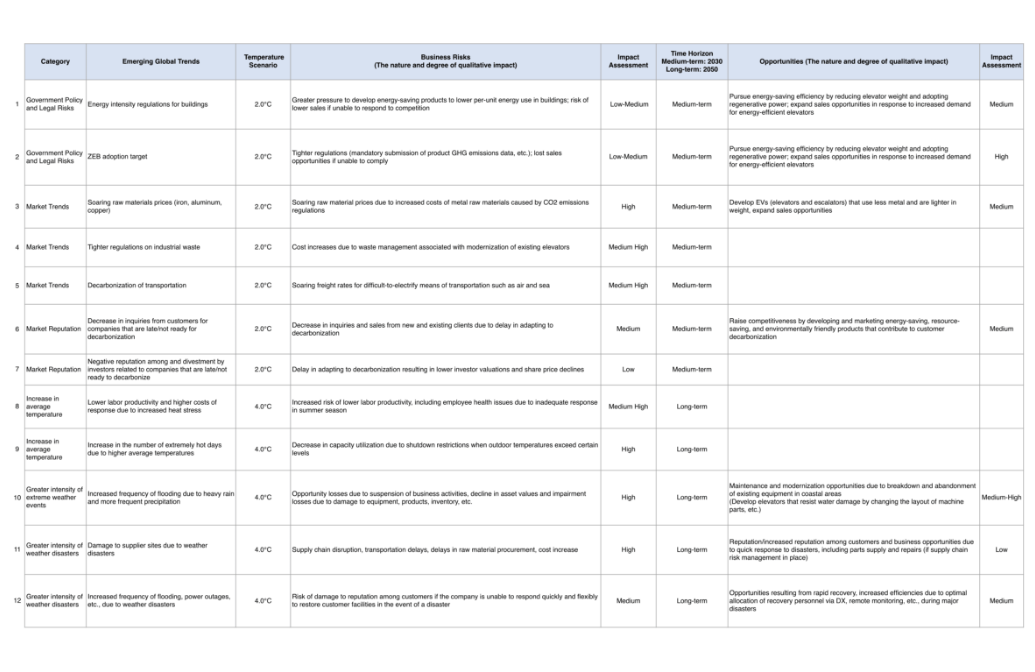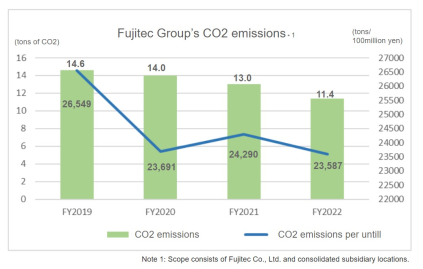
We disclose of climate-related information
based on TCFD framework,
We will further enhance this information and
promote a series of activities.
Practicing the principles of our Management Philosophy, will enable Fujitec to achieve harmonious coexistence with society and nature, as well as contribute to the creation of sustainable societies. We work together with stakeholders in a variety of business activities that include the pursuit of safety and security, human resources development, technology transfer, social contribution and environmental activities.
The Sustainability Committee, under the supervision of Fujitec’s Representative Director and President, analyzes and manages risks and opportunities related to climate change. Together with other sustainability issues and initiatives, the Committee confirms alignment with management plans, managing and overseeing the implementation of relevant measures. The Sustainability Committee also reports to the Board of Directors on important sustainability issues, including climate change, as required.
Specific analyses and measures related to climate change issues are conducted by the Sustainability Promotion Office under the supervision of the Board of Directors, the Sustainability Committees and the owner of the environmental materiality.
In addition, the Sustainability Promotion Office collaborates with group business units, head office organizations, and subsidiaries to incorporate climate change risks and opportunities into business strategies and consider measures to address climate change-related issues, management indicators, and targets. The Office escalates and reports to the Sustainability Committee.
We conducted a qualitative analysis of the impact of climate change on business and performance based on the TCFD framework.
We conducted scenario analysis based on the following two scenarios:
The basic time horizon of the analysis was the year 2030 for transition risk and the year 2050 for physical risks.
We selected Fujitec Co., Ltd. and consolidated subsidiaries as the scope of analysis.
We will continue to assess the financial impact of the risks and opportunities identified, to generate countermeasures to address the risks and opportunities.

Fujitec established the Risk Management Committee, chaired by our President, to reduce business risks and eradicate risks that have a major impact on society, including ethical, legal, environmental, and quality issues. The Committee strives to ensure the early detection of risks and appropriate responses measures.
As a subordinate organization, the Risk Management Operation Committee was established to collect information, provide guidance and management of risk management functions on a company-wide basis.
This Committee is also charged with taking prompt and appropriate action to deal with potential risks surrounding the company.
As with company-wide risk management processes, once analyses have been performed by the Sustainability Committee and the Executive Committee, the Risk Management Committee reports to the Board of Directors as appropriate about the degree of impact and management status of important risks related to climate change.
The amount of carbon dioxide emissions of the Fujitec Group (hereinafter referred to as CO2 emissions) is shown below.
In fiscal year 2022, the amount of CO2 in scope 1 and 2 decreased by 11.2% (compared to the amount in fiscal year 2019, which was set as the base year), resulting in a figure of 23,587 tons.
The sales volume intensity decreased by 21.9% from 14.6 tons per 100 million yen in fiscal year 2019, which was set as the base year, resulting in a figure of 11.4 tons per 100 million yen.
We, Fujitec, will continue to proactively fulfill our social responsibilities by aiming to solve various social issues such as decarbonization, etc., as an environmentally and socially friendly company, and by deeply considering what contributions we can make as a company responsible for building social infrastructure.
In addition, as our proactive approach to decarbonization, we, Fujitec, will promote active information sharing with many suppliers in our supply chain now and in the future, and will continue to strive to capture the amount of our and their greenhouse gas emissions required in Scope 3.
